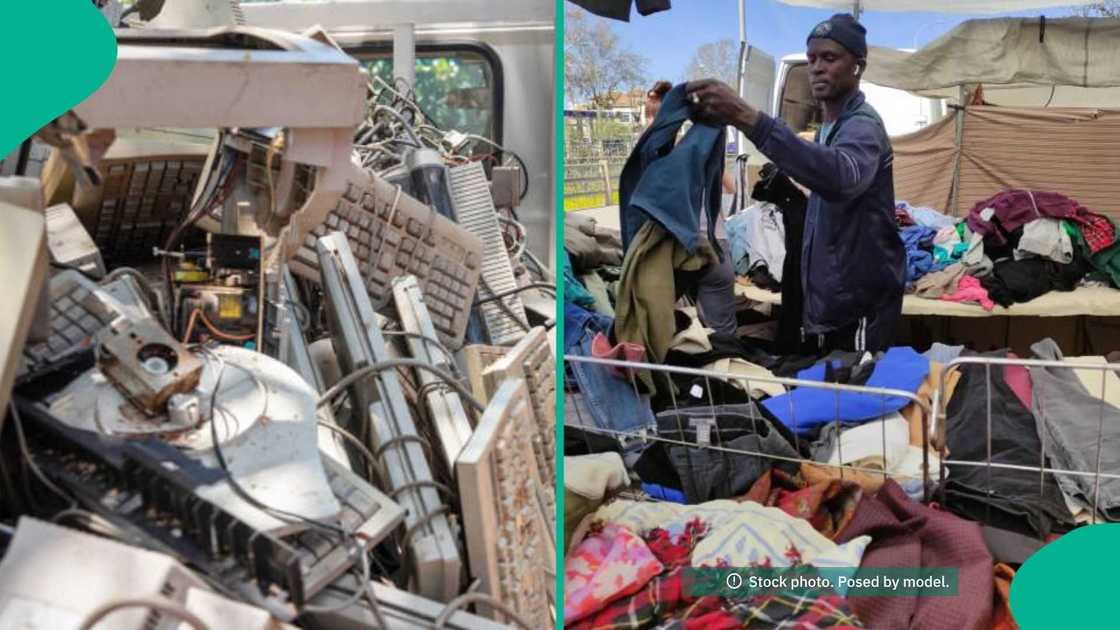How the AfCFTA Can Change Nigeria’s Economic Reality, by Ijafiada Ben-Hirki
Editor's note: In this piece, Ijafiada Ben-Hirki argues that Nigeria must move beyond import dependence and protectionist bans by leveraging AfCFTA to boost local manufacturing, enforce quality standards, and unlock sustainable economic growth through trade and industrial reform.
Nigeria's reliance on second-hand imports, such as used clothing, pre-owned automobiles, and electronic waste, has crippled local manufacturing industries and worsened environmental degradation. The United Nations Conference on Trade and Development Economic Development in Africa 2024 Report warns that Africa’s dependence on volatile commodity exports and weak infrastructure deepens the continent’s vulnerabilities.

Source: Getty Images
These vulnerabilities are more evident in Nigeria, where import dependence undermines industrial growth and intra-African trade. To address these challenges, Nigeria must leverage the African Continental Free Trade Area (AfCFTA). Key actions include strengthening its bargaining power in global trade, creating competitive advantages for local manufacturers, and enforcing trade quality standards over blanket protectionist bans.
The European Environment Agency underscores Africa’s role as the primary recipient of EU exports, with more than 60 percent consisting of used textiles alone. What is not fit for reuse ultimately ends up in open landfills and informal waste streams. In 2022, climate hazards affected one in 13 Africans and caused an estimated $8.5 billion in damages, unveiling the urgent need for sustainable trade policies.
Nigeria must stop passively accepting used imports and instead leverage AfCFTA to negotiate stronger trade deals that protect its industries and environment. Other regions have successfully implemented policies that hold exporters accountable for the long-term impact of their products. A strong model is the EU’s Waste Electrical and Electronic Equipment Directive, which mandates manufacturers to manage the disposal and recycling of electronic waste throughout the product life cycle.
Outright import bans are neither practical nor beneficial, as affordability remains a major concern for Nigerian households. Rather than blanket restrictions and protectionist bans, the Standards Organisation of Nigeria should implement stringent trade quality standards to protect local industries and consumers. South African Revenue Service offers a proven framework, using around 90,000 product codes to ensure only goods meeting safety and environmental requirements enter the market.
Additionally, import permits act as pre-border checks, enabling authorities to link goods consignment to verified importers and prevent economic disruption from unregulated imports. South Africa mandates that importers secure permits before the shipment date and prohibits transfer to another party. Customs South Africa penalizes non-compliance. By adopting uniform port standards and a rigorous control system, the Nigeria Customs Service can regulate imports while maintaining trade openness.

Source: Getty Images
Beyond trade regulations, strengthening the entire value chain is critical to positioning Nigeria as a competitive manufacturing hub. According to the National Bureau of Statistics, one in every twenty Nigerians is now unemployed, marking a 0.8 percent increase since the same period in 2023. Revitalizing manufacturing industries under AfCFTA presents an opportunity to drive job creation and economic transformation.
The manufacturing sector has historically driven economic development, with textiles and clothing contributing significantly to value-added production during their peak years. However, Nigeria must transition from trade facilitation to industrialization. The Nigerian government must support AfCFTA programs that reduce non-tariff barriers and assist businesses in navigating cross-border trade.
While the National Action Committee on AfCFTA has shown commendable commitment, dedicated help desks in commercial cities such as Lagos, Kano, Port Harcourt, and Aba would provide real-time advisory support. Services covering documentation, tariffs, and trade incentives are especially important for emerging manufacturers, including small and medium-sized enterprises. This targeted support would help expand exports beyond textiles to processed goods, machinery, and agro-products.

Read also
After successfully repaying loan, IMF removes Nigeria from top 10 countries with highest debt
Nigeria has already attracted $2.2 billion through the African Development Bank’s Special Agro-Industrial Processing Zones, more than any of the 12 other participating African countries. Still, investment in Special Economic Zones promises to drive reliable electricity and broader infrastructure development further.
The AfCFTA represents a market of 1.5 billion consumers and a combined GDP of $3.4 trillion, forming a vast economic bloc that acts as a catalyst for the country’s industrial expansion. Nigeria must leverage the AfCFTA to strengthen its bargaining power in global trade, enforce trade quality standards instead of protectionist bans, and create competitive advantages for local manufacturers.
Ijafiada Ben-Hirki is a writing fellow at African Liberty.
Disclaimer: The views and opinions expressed here are those of the author and do not necessarily reflect the official policy or position of Legit.ng.
Source: Legit.ng



